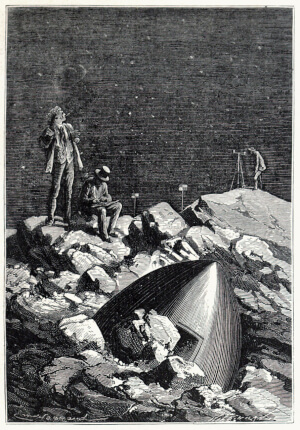A (Very) Short History of Science Fiction

1915 by Willy Pogany
It's difficult to pinpoint when science fiction first emerged as a genre. Two tales from the Arabian Nights, a voluminous collection of short stories brought together over a period of centuries from as early as the ninth, feature themes that would be recognized as science fiction today. One story, "The Adventures of Bulukiya," involves the protagonist's travels across the cosmos, and in another, "Abu al-Husn and His Slave-Girl Tawaddud," a character describes the 'mansions of the moon.'
Novelist Cyrano de Bergerac (not to be confused with the titular pointy-nosed protagonist in Edmond Rostand's play which was loosely based on him) wrote a novel entitled Comical History of the States and Empires of the Moon, published posthumously in 1657; Jonathan Swift's Gulliver's Travels (1726) is a broad mix of fantasy and proto-science fiction; and in the 19th century were published Mary Shelley's novel Frankenstein, Edgar Allen Poe's short story "The Unparalleled Adventures of One Hans Pfaall" which concerns a journey to the moon by use of a balloon, and the many novels of Jules Verne which involve travel through space, through the sea, and even through the Earth to its core.

1870 by Émile-Antoine Bayard
As scientific knowledge deepened over time and crewed space travel was achieved in the mid-20th century, stories of galactic and intergalactic space travel became more firmly dependent on a framework rooted not in fantasy but hard science. Still, in order to tell tales of the impossible, elements of fancy and highly speculative science were still needed to fill the gaps to make stories of intergalactic high drama believable to modern audiences. With the advent of film and television, budgetary considerations had a considerable influence on filling on-screen plot-holes left behind by the limitations of special effects budgets.
This site is an attempt to catalog and explain a few such contrivances utilized to keep science fiction readers and viewers focused on the story instead of crying foul at the rapid-fire breaking of scientific rules we've come to expect in some of our favorite stories.